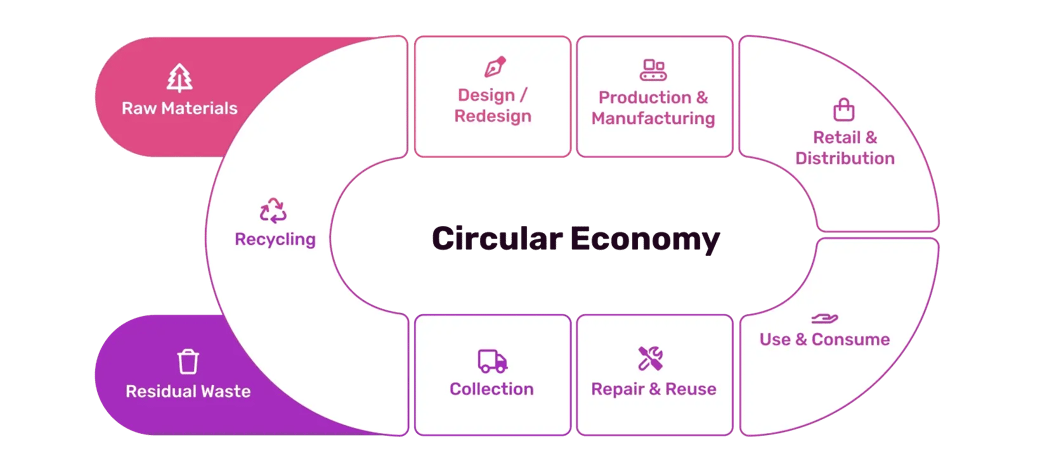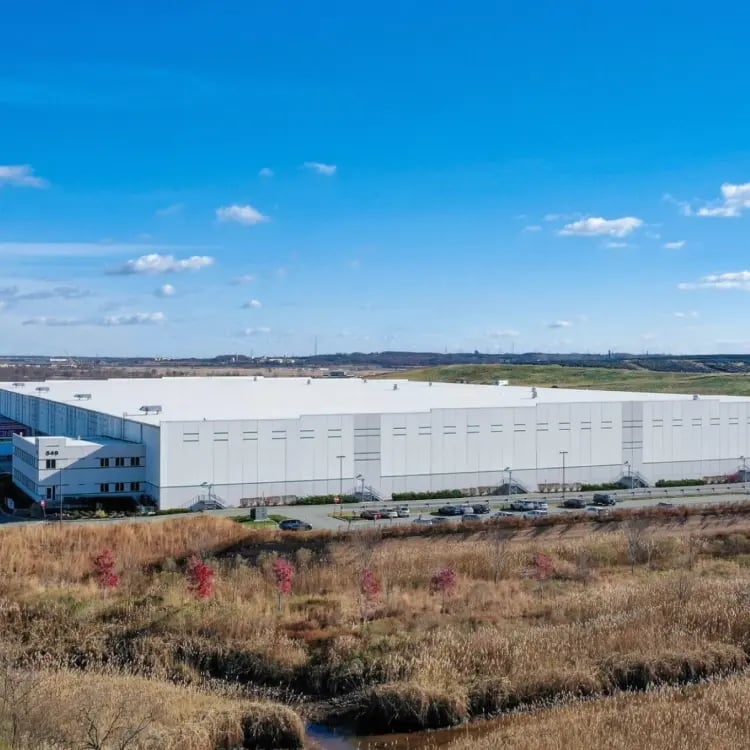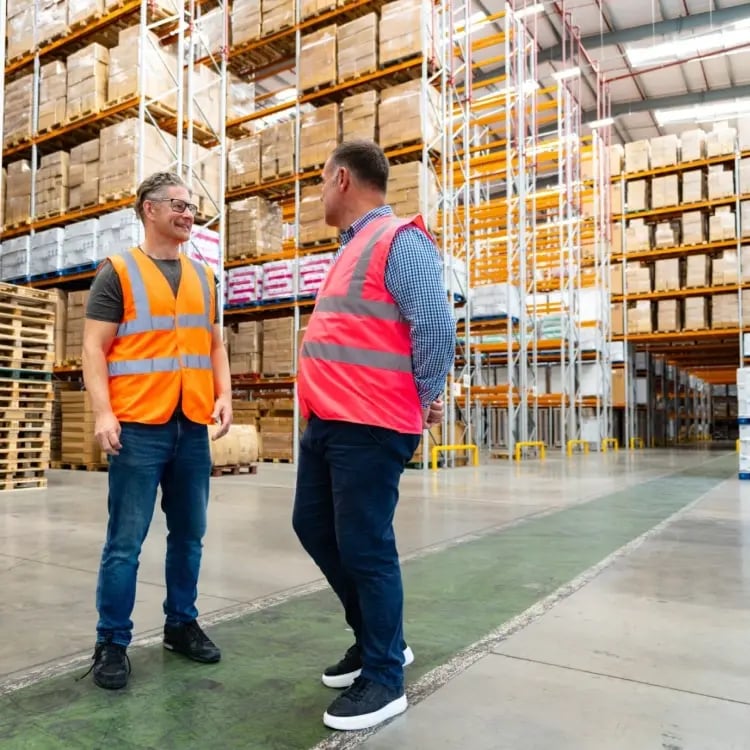Discover how businesses thrive in the B2B sharing economy. Learn strategies to transform gig operations into great successes with expert insights and real-world examples.
From waste to resource: Implementing circular economy principles in logistics

Download your copy of the OmniDisruptors Report.
Lessons from the brands redefining retails in the omnichannel era.
Download the reportResilience is the name of the game when it comes to logistics. We already knew this before the pandemic - but we think we can all agree that the game definitely changed when COVID-19 hit (in more ways than one). It also accelerated the sustainability movement, across multiple industries, not just our own. Organisations across the world finally began to acknowledge the impact of their 2operations on the environment and the importance of tackling sustainable challenges head-on.
We actually have a huge amount of responsibility on our shoulders. Shipping vast quantities of goods and materials across the globe, we need to embrace the concept of turning waste into a valuable resource. We’re helping multiple retail brands and eCommerce companies spearhead transformative initiatives that not only reduce environmental impact, but also pave the way for a more sustainable future.
For us, it starts with implementing circular economy principles, not only reducing environmental impact, but also creating a robust supply chain. Not too shabby when it comes to navigating the unknown (i.e. a global pandemic). Let’s take a look at some of the challenges eCommerce organisations face and how understanding and implementing a circular economy model can help.
The Circle Game: Understanding circular economy in logistics
The circular economy challenges the traditional linear model of production and consumption, which follows a ‘use-create-discard’ (or ‘use-choose-abuse’ if you’re feeling creative) pattern. In contrast, a circular economy seeks to keep products and materials in use for as long as possible, extracting maximum value from them, and then recovering and regenerating products and materials at the end of their service life.
Quite simply put (or as our Joni Mitchell inspired-subtitle suggests), it keeps the wheels in motion and keeps things turning.
For the logistics industry, this translates into rethinking processes and systems to minimise waste generation, optimise resource utilisation, and innovate in product design and packaging.
On the surface, it sounds exceedingly enticing. Aside from the environmental benefits, it’s a no-brainer for your bottom line too (not only keeping the wheels in motion, but your profit centres too). So why is it taking so long for logistics and eCommerce organisations to adopt this model?
Going round in circles
Despite the clear benefits of embracing circular economy principles, many eCommerce and logistics companies have been slow to adopt them. And when we say slow, think snail. One primary reason is the perceived complexity and cost associated with transitioning to circular business models. But this couldn’t be further from the truth (especially if you look at the bigger picture).
Implementing circular economy initiatives often requires significant upfront investment in technology, infrastructure, and workforce training, which can be daunting for companies focused on short-term profitability (spoiler: not the best idea). The traditional economy model has long been ingrained in business practices, making it challenging for companies to shift paradigms and adopt new ways of thinking. It smacks of ‘but we’ve always done it that way’. We can tell.
Aside from everything else, there could be huge regulatory barriers in place or lack of clear incentives for companies to prioritise sustainability initiatives. But, as consumer awareness and demand for sustainable products and services continue to grow, companies that fail to embrace circular economy principles risk falling behind their competitors and facing reputational damage in the long run. Don’t say we didn’t warn you.
Let us help you visualise this a bit better...

Waste not want not
Okay, so less of the fear-mongering and more of the advice-giving. One of the most impactful ways logistics companies can embrace circular economy principles is by repurposing waste materials. Rather than viewing waste as a burden, see it as a potential resource waiting to be unlocked.
For instance, some companies have implemented programmes to repurpose cardboard boxes and packaging materials. Instead of discarding these materials after a single use, they’re collected, sorted, and reintroduced into the supply chain. Some companies even partner with third-party recyclers or invest in on-site recycling facilities to ensure that waste materials are efficiently processed and reused.
Turning trash into treasure
Recycling is the epitome of the circular economy. One man’s trash is another man’s treasure and all that. Investing in robust recycling programmes to close the loop on materials and reduce your environmental footprint is a great place to start.
Initiatives to recycle and refurbish equipment and infrastructure, such as pallets and containers, are gaining traction as companies seek to extend the lifespan of these assets and minimise waste generation.
Quashing green-washing at fulfilmentcrowd
At fulfilmentcrowd, sustainability isn't just a buzzword - it's ingrained in our business model. In fact, it literally IS our business model. Unlike traditional logistics companies that may prioritise expansion through building new fulfillment centers, we take a different, more sustainable approach.
Recognising the environmental impact of constructing new facilities, we leverage existing infrastructure, making use of empty space in warehouses across the globe. By maximising the efficiency of these spaces, we not only reduce our own carbon footprint, but also that of our clients. But, our commitment to sustainability extends beyond facility management. We closely monitor the environmental impacts of our operations, from energy consumption to packaging waste and final mile delivery. Through strategic utilisation of low or zero-emission shipping services, we actively work to lower carbon emissions - so not only are we green, but you are too (and your competitors will be green with envy).


Easy packings
Innovation in product design and packaging is another way to take your spin (see what we did there?) on circular economy principles. By designing products and packaging with recyclability and reusability in mind, you can significantly reduce the environmental impact of your operations.
Whether that’s experimenting with compostable or biodegradable packaging materials to minimise the environmental impact of packaging waste, or exploring innovative packaging designs, such as reusable containers or packaging-as-a-service models, there’s a plethora of options out there.
Key benefits of the circular economy
-
Cost savings: Adopting circular economy practices can lead to reduced waste generation, lower material costs, and increased resource efficiency, ultimately translating into significant cost savings for eCommerce companies and retailers. Cha-ching.
- Improved resource efficiency: By reusing materials and products, you can minimise the need for virgin resources, leading to improved resource efficiency and reduced environmental impact.
- Enhanced brand reputation: Embracing circular economy principles demonstrates a commitment to sustainability, enhancing your brand reputation amongst environmentally-conscious consumers (and these individuals aren’t going anywhere - and rightly so).
- Differentiation in the market: Let’s face it, retail is a dog-eat-dog world. Adopting circular economy practices can help differentiate your company from competitors and attract environmentally-conscious consumers and those who are likely to stay loyal.
- Regulatory compliance: As governments around the world implement stricter regulations on waste management and environmental protection, with circular economy principles, you’ll be better positioned to comply with evolving regulatory requirements.
- Customer loyalty: By offering sustainable products and implementing eco-friendly practices, you can build stronger relationships with customers who value environmental responsibility, leading to increased customer loyalty and retention.
- Innovation opportunities: Embracing circular economy principles often requires innovative solutions in product design, packaging, and logistics, giving you more opportunities for creativity. Get your thinking caps on.
- Reduced environmental impact: Perhaps the most significant benefit of the circular economy is its potential to reduce the environmental impact of your operations, including carbon emissions, waste generation, and resource depletion. Mother Earth says thank you in advance.
- Supply chain resilience: With circular economy principles, you can diversify your supply chains, reduce dependency on finite resources, and build resilience against disruptions caused by resource scarcity or environmental disasters.
- Long-term sustainability: By transitioning to a circular economy ethos, you can build a more sustainable business model that ensures long-term viability and resilience in the face of global environmental challenges. And that can’t be a bad thing.
Coming full circle
We all know that the logistics industry has a critical role to play in advancing the transition to a circular economy. There’s no getting around it (🥁). By implementing waste reduction, resource optimisation, and innovation in product design and packaging, logistics companies can not only minimise their environmental impact, but also drive that all-important, positive change throughout the supply chain. Not something to be sniffed at.
For the powers that be in the logistics world, embracing circular economy principles isn't just about sustainability - it's about future-proofing their businesses and staying ahead of evolving consumer expectations. By investing in circular economy initiatives today, logistics companies can build a more resilient and sustainable future for tomorrow. It’s the stuff dreams are made of.
If you’re looking to make some big, positive changes to your business, why not start with a new, sustainable partner in growth? Hint - it’s us.
Looking for more industry insights?
Check out our other recommendations just for you!
See allSustainable order fulfilment is here, with biodegradable packaging, low energy consumption, and low-emissions carriers to choose from. Read more here.
Improve returns and improve customer experience with fulfilmentcrowd’s Delivery Assured portal. Automate processes, reduce costs, and protect your brand.


.jpg?width=300&name=Dublin-warehouse%20(1).jpg)
.webp?width=300&name=Omnidistruptors-mockup1%204%20(1).webp)
.jpg?width=300&name=GAAstore-lifestyle-image%20(2).jpg)

 By Alice Davies
By Alice Davies




